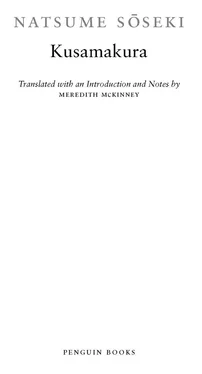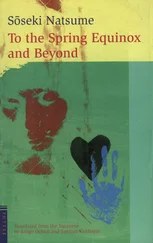Natsume Soseki - Kusamakura
Здесь есть возможность читать онлайн «Natsume Soseki - Kusamakura» весь текст электронной книги совершенно бесплатно (целиком полную версию без сокращений). В некоторых случаях можно слушать аудио, скачать через торрент в формате fb2 и присутствует краткое содержание. Жанр: Старинная литература, на английском языке. Описание произведения, (предисловие) а так же отзывы посетителей доступны на портале библиотеки ЛибКат.
- Название:Kusamakura
- Автор:
- Жанр:
- Год:неизвестен
- ISBN:нет данных
- Рейтинг книги:4 / 5. Голосов: 1
-
Избранное:Добавить в избранное
- Отзывы:
-
Ваша оценка:
- 80
- 1
- 2
- 3
- 4
- 5
Kusamakura: краткое содержание, описание и аннотация
Предлагаем к чтению аннотацию, описание, краткое содержание или предисловие (зависит от того, что написал сам автор книги «Kusamakura»). Если вы не нашли необходимую информацию о книге — напишите в комментариях, мы постараемся отыскать её.
Kusamakura — читать онлайн бесплатно полную книгу (весь текст) целиком
Ниже представлен текст книги, разбитый по страницам. Система сохранения места последней прочитанной страницы, позволяет с удобством читать онлайн бесплатно книгу «Kusamakura», без необходимости каждый раз заново искать на чём Вы остановились. Поставьте закладку, и сможете в любой момент перейти на страницу, на которой закончили чтение.
Интервал:
Закладка:
I have been on many journeys since then, but never again until this night in Nakoi have I had a similar experience.
Lying there on my back, I happen to open my eyes and notice hanging above the sliding doors a piece of cal igraphy framed in red lacquer. Even from where I lie, I can clearly read the words: “Bamboo shadows sweep the stair, but no dust moves.â€2 I can also make out that the signature seal gives the cal igrapher’s name as Daitetsu. Now I am in no way a connoisseur of cal igraphy, but I have always loved the style of the Obaku Zen priest Kosen. There’s a lot to be said for the cal igraphy of Ingen, Sokuhi, and Mokuan as wel ,3 but Kosen’s writing is the most powerful and meticulous. Looking at these seven characters before me now, both the handling of the brush and the flow of the writing hand convince me that it must be the work of Kosen. But this cannot be so, as the signature is Daitetsu. I consider the possibility that there might also have been a priest named Daitetsu in the Obaku sect at that time, but the paper looks far too new. It can surely only be a recent work.
I turn on my side. Now my eyes take in the painting of cranes by Jakucho that hangs in the alcove.4 Art being my line of work, I registered this as a superb piece when I first entered the room. Most of Jakuchu’s works have a quite delicate coloration, but this crane is executed with a single defiant brushstroke. The featherlight, egg-shaped body poised jauntily on its single leg has a wonderful rightness to it, and the sense of nonchalant ease continues right down to the tip of the beak. Beside the alcove is a single shelf with a cupboard beyond. What is in the cupboard I cannot tel .
I slip into a peaceful sleep, into dream.
The Nagara maiden in her long-sleeved kimono is riding over the mountain pass on a white horse when suddenly the Sasada man and the Sasabe man leap out on her from either side and both begin to pul at her. The girl now suddenly becomes Ophelia, lying upon a drifting wil ow branch in the water’s flow, singing beautiful y. I pick up a long pole and race along the bank in search of a place from which to rescue her, but she floats away and is lost to sight, singing and smiling, apparently perfectly at ease. I stand cal ing desperately after her, the pole over my shoulder.
Then I awaken. My armpits are soaked with sweat. What an extraordinary jumble of the poetic and the vulgar that dream was! I think in bemusement. The early Zen priest Daie is said to have suffered greatly from the fact that even the enlightened mind, which has mastered the il usion of reality, is stil troubled by dreams of the vulgar world. I can quite see his point. One whose cal ing in life is the arts surely doesn’t cut much of a figure if his dreams aren’t a bit more tasteful than the norm. I rol over, thinking to myself that most of my dream is quite useless from the point of view of a painting or a poem—and suddenly moonlight is pouring in through the paper screen doors onto the balcony, steeping them with the slanting shadows of several branches from the tree beyond. It is a bril iantly clear spring night.
Perhaps I am imagining it, but I think I can hear someone softly singing. I strain to catch the sound, wondering whether the song of my dream has somehow slipped out into the real world, or whether a voice from the real world has insinuated itself into the distant realm of my dream. Yes, someone is definitely singing. Smal , low voice though it is, a thin thread of sound is pulsing faintly in the sleepy spring night. Strangely, it’s not only the melody that comes to me; when I concentrate, I can also make out the song’s words, though catching them from such distant singing would seem impossible. They are repeating over and over the song of the Nagara maiden: As the autumn’s dew
that lies a moment on the tips
of the seeding grass,
so do I know that I too must
fade and be gone from this brief world.
At first the voice sounds quite close to the balcony, but it grows gradual y fainter and more distant. When a thing finishes abruptly, you register the abruptness of its ending, and the loss is not deeply moving to you. A voice that breaks off decisively wil produce a decisive feeling of completion in the listener. But when a phenomenon fades natural y away toward nothing with no real pause or break, the listening heart shrinks with each dwindling minute and each waning second to a thinner forlornness. Like the beloved dying husband who yet does not die, the guttering flame that stil flickers on, this song racks my heart with anticipation of its end and holds within its melody al the bitter sorrows of the world’s transient springs.
I have been listening from my bed, and as the song grows more distant, my ears ache to fol ow, though aware that they are being lured. With the dwindling of that voice, these ears long to rise of their own accord and fly in yearning pursuit of it. A bare second before the last pulse of sound must surely no longer reach my straining hearing, I can bear it no longer, and in a moment I have slipped from the bed and opened the screen doors to the balcony. The lower part of my legs is instantly bathed in moonlight. The tree shadows fal wavering over my night robe.
When I first slide open the paper doors, I notice none of this. Where is that voice? My eyes seek the place where my eager ears have already guessed the answer lies—and there it stands, a vague shadowy shape withdrawn from the moonlight, its back to the trunk of what, judging from the blossoms, might be an aronia tree. Before I have even an instant to try to comprehend what it is, the black shape turns and moves off to the right, trampling the shadow of the blossoms as it goes. Then a tal woman’s form slides fluidly around the corner, and the edge of the building that my own room is part of hides her instantly from sight.
I stand entranced at the doors awhile longer, clad only in the single layer of the inn’s night robe, until I come to myself again and realize that the spring night in this mountain vil age is in fact extremely cold. Then I return to the hol ow of bedclothes from which I earlier emerged, where I begin to ponder what I have just witnessed. I extract my pocket watch from beneath the pil ow. It is ten minutes past one. Pushing it back under the pil ow, I think some more. This can’t possibly have been an apparition. If it wasn’t an apparition, it must be a human, and if human, it was a woman.
Perhaps it was the daughter of the household. But it’s surely rather unseemly for a woman separated from her husband to come out at night like this into a garden, and one that merges into the wild hil beyond. Wel , be that as it may, the fact is I can’t sleep. Even the watch under my pil ow intrudes on my thoughts with its ticking. I’ve never been bothered before by the sound of my pocket watch, but tonight it seems to be urging and berating me— Let’s think, let’s think, it instructs. Don’t sleep, don’t sleep. Damn the thing!
If you see something frightening simply as what it is, there’s poetry in it; if you step back from your reactions and view something uncanny on its own terms, simply as an uncanny thing, there’s a painting there. It’s precisely the same if you choose to take heartbreak as the subject for art. You must forget the pain of your own broken heart and simply visualize in objective terms the tender moments, the moments of empathy or unhappiness, even the moments most redolent with the pain of heartbreak. These wil then become the stuff of literature and art. Some wil manufacture an impossible heartbreak, put themselves through its agonies, and crave its pleasures. The average man considers this to be sheer fol y and madness. But someone who wil ful y creates the lineaments of unhappiness and chooses to dwel in this construction has, it must be said, gained precisely the same vantage point as the artist who can produce from his own being some supernatural landscape and then proceed to delight in his self-created magical realm. In this respect the many artists of the world are madder and more foolish than the average man, at least insofar as they are artists. (I say nothing of how they may be in their everyday guise.) While we are on our journey, shod in our straw sandals as of yore, we may do nothing but grumble about its hardships from dawn to dusk, but when we come to tel the tale to others, we wil never make a murmur of such complaints. No, we wil speak smugly of its fascinations and pleasures and even proudly prattle on about al those things that annoyed us so much at the time. We do so not from any intention to deceive ourselves, or to lie to others. Rather, the contradiction arises because on the journey we are our everyday selves, while when we tel its tale we speak as poets. I suppose you could say that the artist is one who lives in a three-cornered world, in which the corner that the average person would cal “common sense†has been sheared off from the ordinary four-square world that the normal inhabit.
Читать дальшеИнтервал:
Закладка:
Похожие книги на «Kusamakura»
Представляем Вашему вниманию похожие книги на «Kusamakura» списком для выбора. Мы отобрали схожую по названию и смыслу литературу в надежде предоставить читателям больше вариантов отыскать новые, интересные, ещё непрочитанные произведения.
Обсуждение, отзывы о книге «Kusamakura» и просто собственные мнения читателей. Оставьте ваши комментарии, напишите, что Вы думаете о произведении, его смысле или главных героях. Укажите что конкретно понравилось, а что нет, и почему Вы так считаете.












